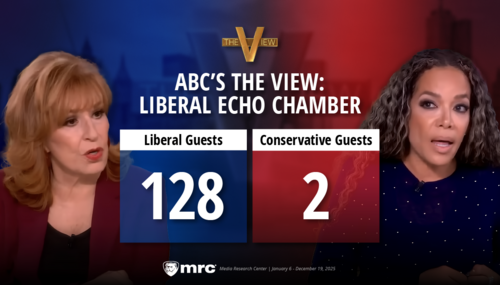Is Barack Obama above criticism in the eyes of the liberal media? The
Milbank is one of the more readable wordsmiths, largely because he's not quite as predictable as other ink-stained wretches working for liberal-leaning news outlets.
But he lapsed into kneejerk liberal attack mode on May 23 when his candidate, Barack Obama, came under scrutiny from conservatives investigating Obama's connections with people from the hard Left.
The best way to protect your candidate from accusations that could hurt his candidacy is to ridicule the messenger and thereby intimidate others from even thinking of going there.
That's what Milbank did in “Obama as You've Never Known Him!”
The Page A-3 column is a non-stop ridicule of a press conference on May 22 in Washington, in which a news analyst and a researcher unearthed a history of radical and far-left elements among people who may have influenced the character and worldview of a Barack Obama, beginning in his high-school days.
The news analyst was Cliff Kincaid, president of
Kincaid provided the attendees, including Milbank, with two substantial reports, the 44-page “Communism in Hawaii and the Obama Connection,” and the 36-page “Communism in Chicago and the Obama Connection.” But Milbank wasn't really interested in the reports, which are heavily footnoted and documented and include several exhibits from congressional hearings into communist activities.
Instead, Milbank cast the gathering as a wild group of conspiracy theorists throwing out absurd, unsubstantiated charges.
Here are four of the methods that Milbank employed to ridicule the investigators:
-
Describe the sponsoring group in a demeaning fashion: “The group, assembled by something called
“'We decided to start going back and seeing what things influenced him even before he was born,' Romerstein announced without a trace of irony, before tying Obama to the Communist Party of the 1930s in Hawaii and Soviet spies on the island. 'This is the atmosphere that young Barack Obama grew up in.'”
Milbank takes particular offense at Kincaid's assertion that Obama was heavily influenced by a Communist Party USA (CPUSA) activist in
Yes, it's hard to believe a claim that an American presidential nominee was influenced by a Communist, especially if you ignore the supporting evidence, as Milbank does. Milbank does not even mention the “mentor's” name. He is, in fact, the mysterious “Frank” in Obama's book, Dreams of My Father, and was identified at the conference as the black writer and poet Frank Marshall Davis. Quoting from Obama's own book, as well as congressional hearings, interviews, speeches, articles, and books, Kincaid presented hard evidence that “Frank” is Davis, and that Davis was a member of the CPUSA and was in fact involved in a Soviet-sponsored network in Hawaii that was judged by Congress at the time as a security threat to the U.S. Milbank never acknowledges the evidence, even though he handled copies of the reports while the briefing was going on, suggesting that Kincaid just sort of made it up.
The real question is how much influence “Frank” had on the young Obama. For his part, Obama in his book Dreams of My Father talks about “Frank” giving him advice on his life and career path, telling him to avoid compromise when he goes off to college and noting that black people feel they have a right to hate white people. Obama makes several references to “Frank” in his book. Gerald Horne, a writer for a Communist Party publication, was the first to publicly name “Frank” as Frank Marshall Davis, saying
Kincaid went for additional confirmation, interviewing Dr. Kathyrn Takara of the
Takara told Kincaid that she thought that Obama concealed “Frank's” true identity because
Later in his piece, Milbank takes another shot at Kincaid, accusing him of “the unilateral decision to accuse [Weather Underground leader Bernardine] Dohrn of the 1970 killing of a policeman, a charge no prosecutor has made.”
In fact, Kincaid was quoting Dohrn's husband, then-Weather Underground terrorist Bill Ayers, who had identified Dohrn as the perpetrator of the bombing which killed the policeman, according to Larry Grathwohl, an FBI informer in the terror group who wrote about it in his own book, Bringing Down America, and testified about it before the Senate Internal Security Subcommittee.
But Milbank makes it seem as if Kincaid himself made up a groundless accusation out of whole cloth.
The question of why Dohrn was never prosecuted is something that the media should pursue. Is there evidence, including Grathwohl's account, that could be used to prosecute Dohrn? There is no statute of limitations on murder. A grand jury in
“In general, members of the terror group were not prosecuted for their bombings because the FBI's desperate pursuit of them crossed the line into illegality itself,” Kincaid said. “Evidence was obtained using questionable means and it would have been thrown out of court.”
The real message of Milbank's screed against the conferees was a general warning not to raise questions about Obama's radical ties, or you'll be ridiculed. Ask any questions about Sen. Obama's formation of character and worldview, or his associations, and even if you pile up impressive and voluminous evidence, you will be pilloried as part of the “Vast Right Wing Conspiracy,” a term that Milbank actually uses sardonically in his third paragraph.
The message to the public is: “Pay no attention to any of this. Look the other way. It's just a pack of lies from right-wing extremists.” If the discussion touches at all on communism, well, you know how the red-hunter Sen. McCarthy has become a handy brush to paint someone as a conspiracy nut. To his, uh, credit, Milbank did not actually use the word “McCarthyism.”
The warning also goes out to journalists not to look into any of this, either. After all, who in the liberal media would want to be accused of aiding and abetting the Vast Right Wing Conspiracy?





